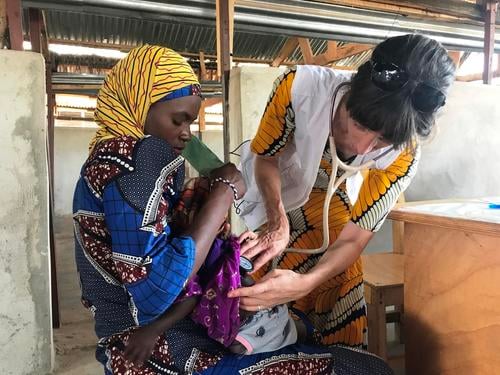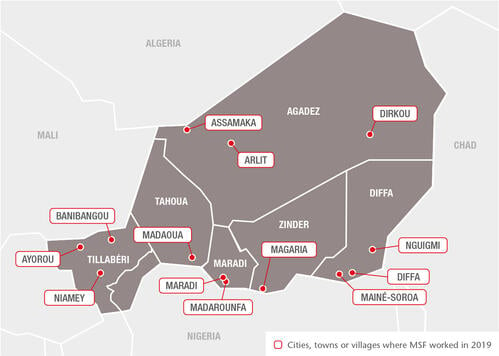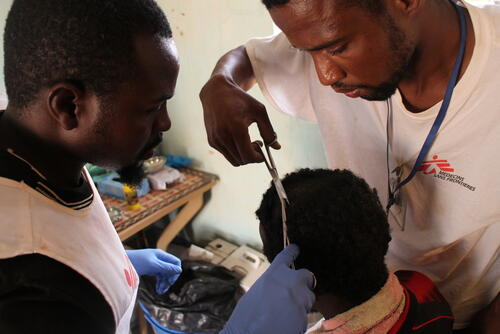
436,100
436,1
220,300
220,3
67,600
67,6

28,000
28,
19,000
19,
7,250
7,25
Médecins Sans Frontières (MSF) continued to assist refugees, displaced people and vulnerable communities, but rising insecurity severely restricted our ability to reach many in need.
Delivering healthcare in conflict areas
In 2019, there were numerous attacks and incursions in Diffa, the southeastern region bordering Nigeria. These often involved killings and kidnappings, and caused thousands of people to flee their homes, particularly in Diffa and Nguigmi departments.
In response to the increased needs in Diffa, we ran mobile clinics and expanded our nutrition activities at Nguigmi hospital and two specialised health centres. We also provided technical assistance to outpatient feeding centres treating severely malnourished children. Another focus of our work was the district hospital, where we supported the opening of an operating theatre.
On 26 April 2019, unidentified armed men attacked our office in Mainé-Soroa in Diffa. One staff member was slightly injured, four vehicles were set on fire and the premises were damaged. As we could not ensure the safety of our staff and patients, we decided to cease activities in June. The project, opened in July 2017, offered medical care to people both in Diffa and across the border in Nigeria.
In Tillabéri region, which shares borders with Mali and Burkina Faso, we worked to increase the availability of free healthcare for vulnerable and displaced people, refugees and local communities affected by the conflict by deploying mobile clinics to remote and inaccessible areas, administering vaccinations and screening for malnutrition.
During the year, our teams in Ayorou rural commune carried out 12,400 consultations through health centres in Koutougou and Ayorou and mobile clinics deployed to displacement camps in Kongokiré and Igagalan.
Following the almost daily attacks perpetrated by armed groups, the government declared a state of emergency covering Tillabéri and Diffa regions, and obliged humanitarian workers to use armed escorts. This had a serious impact on our activities and further reduced people’s access to healthcare and other public services.
Increasing assistance for displaced people
Niger is a major transit country for migrants, asylum seekers and refugees expelled from Algeria, returned from Libya or travelling north to Europe. These people are often victims of abuse and social exclusion.
In 2019, in Agadez region, we scaled up our activities to assist migrants who had been turned back at the border village of Assamaka and internal migrants working in the mining sites at Tabelot in Dirkou, as well as vulnerable host communities.
In Dirkou, we set up a search and rescue system for migrants lost/abandoned in the desert and a telephone hotline for migrants to call for assistance, and conducted search and rescue operations in Ténéré desert and Kawar.
Addressing the annual malnutrition and malaria peak
Each year between July and October, food shortages and heavy rains trigger a spike in malnutrition and malaria in Niger, especially in the southern regions.
Although remarkable progress has been made in the prevention and treatment of childhood diseases in Niger over the past decade, hundreds of thousands of children fall victim to this chronic emergency each year. Recently, violence and growing insecurity in Niger and neighbouring countries have put an additional strain on the health system.
In 2019, MSF collaborated with the Ministry of Public Health to treat 191,400 children for malaria and 43,400 cases of malnutrition in Madaoua, Madarounfa and Magaria. Most of the children who required inpatient care were admitted in July and August, the start of the seasonal peak.
Every year, to cope with the influx of patients, many of whom are in a critical condition, we increase our hospital capacity. In 2019, we admitted more than 15,300 children under the age of five – an average of 42 a day – to Magaria district hospital’s paediatric unit, and during the peak, we admitted 46 children to intensive care each day. We also provided care for over 17,000 children admitted to Madarounfa hospital’s paediatric wards and intensive feeding centre.
To reduce the number of patients with complications, we continue to focus on developing preventive and decentralised approaches. In Madarounfa, we have extended our activities from reinforcement during the peak period to year-round support to facilitate timely access to healthcare for children under the age of five. Community health workers worked throughout the year to test and treat simple cases of malaria, carry out nutritional screening and manage simple diarrhoea in children in their villages.
This strategy of decentralisation was mainly implemented to reduce the number of admissions to health facilities and prevent children from dying at home in their villages because no medical care is available. If sick children receive early care in their communities, their symptoms can be prevented from worsening and they are cured faster.
We also strengthened our community approach in Magaria, for example by providing early treatment for malaria, acute respiratory infections and diarrhoea. Our teams opened 30 malaria treatment sites during the peak period.
Responding to disease outbreaks and other emergencies
We continued to support the health authorities with vaccinations, epidemiological surveillance and emergency interventions to tackle disease outbreaks and other emergencies, including floods and mass displacements across Niger.
In 2019, our Sahel Mobile Emergency Team (Équipe Mobile d’Urgence Sahel, or EMUSA) focused on assisting displaced people, refugees and vulnerable local communities in conflict zones in Tillabéri and Diffa regions. The team also provided medical and humanitarian assistance following flooding, particularly in Kirkissoy, Agadez, Niamey and Bouza health districts, and in Diffa region.
In 2019, EMUSA and other regular projects also supported the Ministry of Health to run measles vaccination campaigns in four health districts, one in Niamey and three in Maradi region, which reached more than 354,200 children. In addition, EMUSA vaccinated 41,800 children in Madaoua and 5,060 in Dirkou against the disease.


















